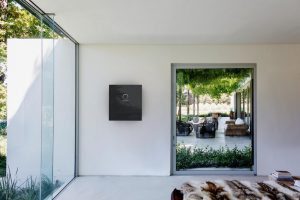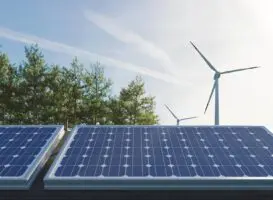Just months after launching its residential battery storage offering onto the Australian market, Germany battery maker Sonnen has flagged the introduction of a household solar and storage deal that threatens to disrupt the traditional retail electricity model.
The deal, called “Sonnen flat,” offers free power to households using the company’s integrated solar and storage system, including for any electricity drawn from the grid when the sun goes down and stored energy is used up.

In return, Sonnen has access to its customers’ installed battery storage capacity to use as a sort of virtual power plant, to provide grid balancing services to network operators – most of the time, without any discernible impact at the customer’s end.
“The deal is, you buy a Sonnen battery to go with your solar and don’t pay for electricity any more,” Sonnen Australia head Chris Parratt told One Step Off The Grid in an interview this week.
“It’s like a mobile phone plan, where the customer purchases the phone up front and gets a plan, if you like. Or, if you use finance, you pay nothing up front, and pay monthly installments instead.
“That’s the way we see the market going,” Parratt added. “Eventually your electricity costs will look like a mobile phone plan.”
Meanwhile, Sonnen starts to look less like a battery business and more like energy retailer, with any losses incurred by giving customers free power more than compensated for through revenue made on the balancing power market – known in Australia as Frequency Control Ancillary Services, or FCAS – where prices are higher than in the regular markets.
Indeed, in Australia’s primary frequency response market – currently dominated by gas peaking plants – prices have been known to surge past $5000/MWh when the grid suffers a sudden shortage of supply and/or surge in demand, or when gas generators game the system.
As we reported here, the Australian Energy Regulator last year found that re-bidding by leading gentailers Origin Energy and AGL Energy in the South Australian electricity market in August and September caused price spikes that loaded more than $17 million of additional costs onto consumers and other generators.
Little wonder, then, that Sonnen – which first rolled out its flat rate model in Germany in September last year and now has 6,000 battery systems in the German balancing market – is targeting Australia, with plans to offer the deal to customers here in the next two months.
Coupled with retail electricity prices that have pushed up consumer bills by more than 100 per cent over the past 10 years; a world-leading rooftop solar uptake; and the removal of premium solar feed-in tariffs, Australia’s is a market that’s ripe for disruption.

“We only started installing Sonnen at the back end of last year in Australia,” Parratt says, “but we expect to be within the top three in the market this year. Especially with (this offer). We expect to be a key player in a market that installs 10-15,000 units per year.”
Sonnen’s battery storage systems will start in Australia at about $6000 fully installed and range up to $25,000, depending on the size of the system.
Parratt has estimated that customer paybacks in Australia will run at six to nine years, depending on the size of the system installed and the solar it is coupled with.
“We have a modular system that starts at 2kWh and goes to 16 kWh in 2kWh increments,” he said. “We actually fit the battery size to the house’s consumption, that’s why we can get the six-year pay back in places like South Australia.”
And what of reports Standards Australia, along with other state regulatory bodies, are considering restricting lithium-ion battery installations inside houses and garages?
Parratt notes that while Sonnen uses Sony-made lithium iron phosphate batteries – a different chemistry to lithium-ion and purpose-built for use in homes – he’s not sure why Australia appears to be going in the opposite direction to the rest of the world on battery installation guidelines.
“There is a standard being released in Germany that allows for lithium-ion batteries to be installed in homes. So why Australia appears to be going the opposite way, I don’t know,” Parratt told One Step.
That said, he added, standards do “need to get into the nitty gritty of battery chemistries” and work out what is safe to hang on your wall and what is not.
“Ours is a very, very safe battery,” Parratt told One Step. “In Europe, we have 30,000 installations and some of those have been around since 2010, and not one fire has happened, no one has been injured. Germany has proved that they can be safe.”
This article was originally published on RE sister site, One Step Off The Grid. To sign up for the weekly newsletter, click here.








